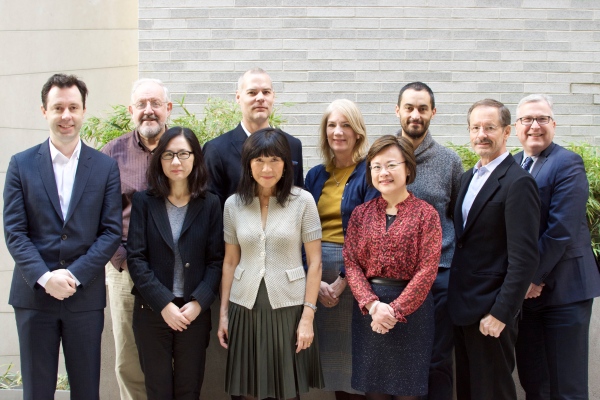Weill Cornell Medicine (WCM) was selected by the Leukemia and Lymphoma Society (LLS) as the only medical institution in New York and one of two sites nationwide to receive a highly competitive grant to improve therapies for mantle cell lymphoma (MCL) patients.
The LLS Mantle Cell Lymphoma Research Initiative (MCL-RI) award of $2.5 million couples with significant matching from WCM to total over $4 million worth of funding provided to accelerate the movement of innovative MCL treatment approaches from the laboratory bench to the patient bedside. The LLS award was sourced in part by generous philanthropic investments supporting the future of cancer research.
The MCL-RI prompted an intra- and inter-institutional collaboration among physicians and researchers at WCM and the Ohio State University Comprehensive Cancer Center, who together leveraged a unique blend of scientific and clinical expertise, state-of-the-art technology and reagents developed in-house to combat drug resistance in mantle cell lymphoma.

The team devised a set of research projects that will ultimately accomplish two major goals via two clinical trials of targeted agents. Goal number one is to define the genomic basis and molecular mechanisms for drug resistance in MCL, and two, to develop therapeutic strategies that overcome this drug resistance.
In preliminary research, the collaborative group analyzed the MCL genes and proteins of individual patients before, during and after treatment with palbociclib, a drug that targets proteins CDK4/6. In healthy cells, CDK4/6 help to dictate the cell cycle prior to division, but in MCL cells, these proteins malfunction, leading to uncontrolled proliferation – the underlying cause of drug resistance and disease progression.
Research at WCM demonstrated that prolonged inhibition of CDK4 not only prevented proliferation of MCL cells, but also made them more sensitive to killing by other drugs, such as ibrutinib, a BTK inhibitor used extensively in MCL treatment. The team found that CDK4 inhibition resulted in architectural changes in DNA and inactivation of the PI3K enzyme – and that these changes were the first steps toward reprogramming MCL cells for a deeper, more durable response to treatment. A phase I clinical trial combining palbociclib + ibrutinib (PALIBR) in recurrent MCL produced responses that were indeed much deeper and longer lasting than those from ibrutinib alone.

A forthcoming multicenter phase II clinical trial of PALIBR in recurrent MCL will aim to define the patient subgroups most likely to benefit from this therapy. By studying the MCL genomes of individual patients in the phase II PALIBR trial over time, researchers will identify the mutations associated with drug-resistance and then target the resistance-specific mutations that they discover.
Following prior trial results showing the combination of lenalidomide with rituximab to be clinically active and well tolerated in patients with previously untreated MCL, the team will also conduct a multicenter phase II trial of a lenalidomide- plus- rituximab- based combination regimen in untreated MLC, using real-time molecular blood testing to modify therapy. Researchers will then evaluate whether these treatment modifications improve tolerability and practicality without compromising efficacy.
The team expects that the proposed projects will shed new light on the genomic basis and mechanisms for drug resistance in MCL, uncover novel resistance biomarkers and lead to the development of individualized therapies that overcome drug resistance in MCL – all of which have profound implications for the treatment of MCL and other blood cancers.
“Our mission to understand and conquer drug resistance with personalized new therapies that are long lasting and less toxic is rooted in deep science, cutting-edge technology, a commitment to advance MCL therapy and seamless clinical and translational collaboration within our team,” said Selina Chen-Kiang, Ph.D., the joint initiative’s director. “In the era of genomics and targeted drugs, we believe our unique synergy, along with the support of MCL-RI funding, will enable us to learn how MCL evolves over time and who will most likely benefit from novel therapies.”
